UnitThree
unit three
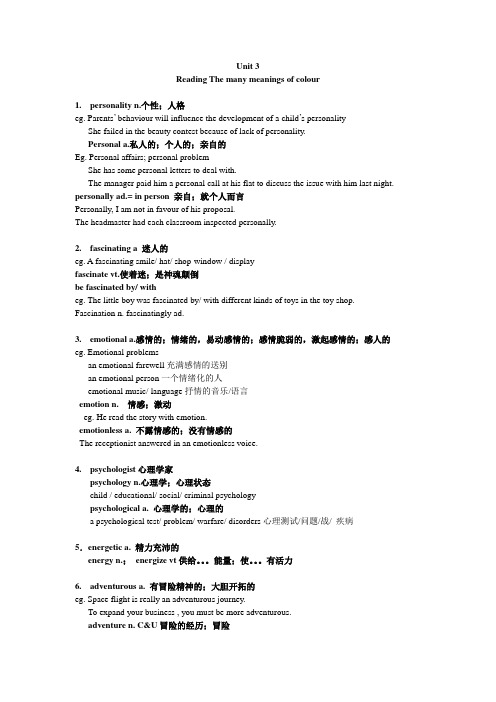
Unit 3Reading The many meanings of colour1.personality n.个性;人格eg. Parents’ behaviour will influence the development of a child’s personality She failed in the beauty contest because of lack of personality.Personal a.私人的;个人的;亲自的Eg. Personal affairs; personal problemShe has some personal letters to deal with.The manager paid him a personal call at his flat to discuss the issue with him last night. personally ad.= in person 亲自;就个人而言Personally, I am not in favour of his proposal.The headmaster had each classroom inspected personally.2.fascinating a 迷人的eg. A fascinating smile/ hat/ shop-window / displayfascinate vt.使着迷;是神魂颠倒be fascinated by/ witheg. The little boy was fascinated by/ with different kinds of toys in the toy shop. Fascination n. fascinatingly ad.3.emotional a.感情的;情绪的,易动感情的;感情脆弱的,激起感情的;感人的eg. Emotional problemsan emotional farewell充满感情的送别an emotional person一个情绪化的人emotional music/ language抒情的音乐/语言emotion n. 情感;激动eg. He read the story with emotion.emotionless a. 不露情感的;没有情感的The receptionist answered in an emotionless voice.4.psychologist心理学家psychology n.心理学;心理状态child / educational/ social/ criminal psychologypsychological a. 心理学的;心理的a psychological test/ problem/ warfare/ disorders心理测试/问题/战/ 疾病5.energetic a. 精力充沛的energy n.;energize vt供给。
【人教版】新目标八年级英语上册:Unit 3 单元说课稿(2)
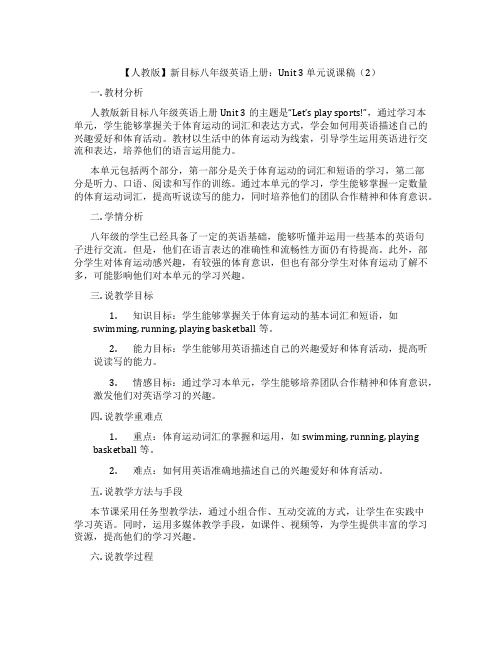
【人教版】新目标八年级英语上册:Unit 3 单元说课稿(2)一. 教材分析人教版新目标八年级英语上册Unit 3的主题是“Let’s play sports!”,通过学习本单元,学生能够掌握关于体育运动的词汇和表达方式,学会如何用英语描述自己的兴趣爱好和体育活动。
教材以生活中的体育运动为线索,引导学生运用英语进行交流和表达,培养他们的语言运用能力。
本单元包括两个部分,第一部分是关于体育运动的词汇和短语的学习,第二部分是听力、口语、阅读和写作的训练。
通过本单元的学习,学生能够掌握一定数量的体育运动词汇,提高听说读写的能力,同时培养他们的团队合作精神和体育意识。
二. 学情分析八年级的学生已经具备了一定的英语基础,能够听懂并运用一些基本的英语句子进行交流。
但是,他们在语言表达的准确性和流畅性方面仍有待提高。
此外,部分学生对体育运动感兴趣,有较强的体育意识,但也有部分学生对体育运动了解不多,可能影响他们对本单元的学习兴趣。
三. 说教学目标1.知识目标:学生能够掌握关于体育运动的基本词汇和短语,如swimming, running, playing basketball等。
2.能力目标:学生能够用英语描述自己的兴趣爱好和体育活动,提高听说读写的能力。
3.情感目标:通过学习本单元,学生能够培养团队合作精神和体育意识,激发他们对英语学习的兴趣。
四. 说教学重难点1.重点:体育运动词汇的掌握和运用,如swimming, running, playingbasketball等。
2.难点:如何用英语准确地描述自己的兴趣爱好和体育活动。
五. 说教学方法与手段本节课采用任务型教学法,通过小组合作、互动交流的方式,让学生在实践中学习英语。
同时,运用多媒体教学手段,如课件、视频等,为学生提供丰富的学习资源,提高他们的学习兴趣。
六. 说教学过程1.热身(5分钟):引导学生进行简单的体育活动,如跑步、跳绳等,激发学生的体育兴趣。
PEP英语六级上册课文Unit新Three
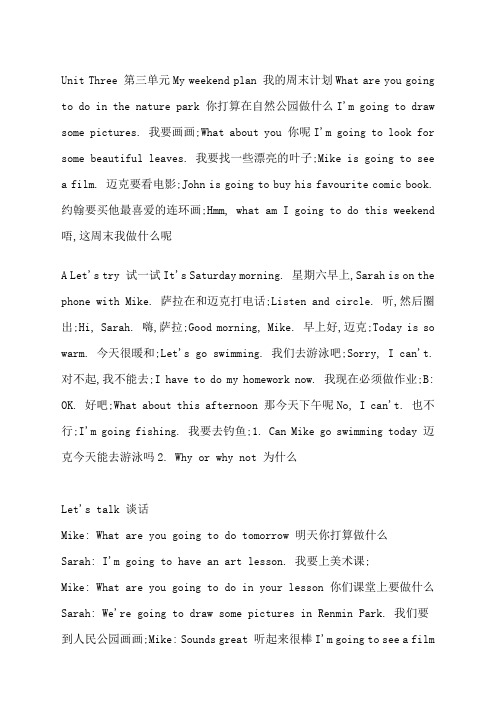
Unit Three 第三单元My weekend plan 我的周末计划What are you going to do in the nature park 你打算在自然公园做什么I'm going to draw some pictures. 我要画画;What about you 你呢I'm going to look for some beautiful leaves. 我要找一些漂亮的叶子;Mike is going to see a film. 迈克要看电影;John is going to buy his favourite comic book.约翰要买他最喜爱的连环画;Hmm, what am I going to do this weekend 唔,这周末我做什么呢A Let's try 试一试It's Saturday morning. 星期六早上,Sarah is on the phone with Mike. 萨拉在和迈克打电话;Listen and circle. 听,然后圈出;Hi, Sarah. 嗨,萨拉;Good morning, Mike. 早上好,迈克;Today is so warm. 今天很暖和;Let's go swimming. 我们去游泳吧;Sorry, I can't. 对不起,我不能去;I have to do my homework now. 我现在必须做作业;B: OK. 好吧;What about this afternoon 那今天下午呢No, I can't. 也不行;I'm going fishing. 我要去钓鱼;1. Can Mike go swimming today 迈克今天能去游泳吗2. Why or why not 为什么Let's talk 谈话Mike: What are you going to do tomorrow 明天你打算做什么Sarah: I'm going to have an art lesson. 我要上美术课;Mike: What are you going to do in your lesson 你们课堂上要做什么Sarah: We're going to draw some pictures in Renmin Park. 我们要tomorrow. 我明天要看电影;Sarah: Have a good time 玩得高兴Mike: You too. 你也是;I have to do my homework now. 我现在必须做作业了;Bye. 再见;Sarah: OK. Bye. 好的;再见;What are Mike and Sarah going to do tomorrow 迈克和萨拉明天要做什么Let's learn 学习Sarah: What are you going to do today 你今天打算做什么Chen Jie: I'm going to see a film. 我要去看电影;visit my grandparents 看望爷爷奶奶see a film 看电影take a trip 旅行go to the supermarket 去超市B Let's try 试一试John is on his way home. 约翰在回家的路上;He sees Amy. 他看到了艾米;Listen and answer. 听,然后回答;Amy, where are you going 艾米,你要去哪儿啊I'm going to buy some fruit. 我要去买一些水果;Nice I'm going to buy some ice cream. 太好了我要去买冰激凌;Do you like ice cream 你爱吃冰激凌吗No, it's for my cousion Jack. 不,是给我表弟杰克的;1. What is Amy going to do 艾米要做什么2. Is the ice cream for John 冰激凌是给约翰的吗Let's talk 谈话My cousin Jack is going to visit me next week.我表弟杰克下周要来看我;That's nice. 太好了;Where are you going 你们要去哪儿We're going to the cinema. 我们要去电影院;We're going to see a film about space travel看一部有关太空旅行的电影;Cool 酷I have lots of comic books about space. 我有许多太空方面的连环画; When are you going 你们什么时候去Next Wednesday. 下周三;Why not go on Tuesday 为什么不周二去呢It's half price then 那时候半价Really Thank you 真的谢谢你Where are John and Jack going next week 约翰和杰克下周要去哪里Let's learn 学习Jack: Where are we going 我们要去哪儿John: To the bookstore. 去书店;I'm going to buy a new comic book. 我要买一本新的连环画; dictionary 字典comic book 连环画word book 单词本postcard 明信片Read and write 读和写Sunday 星期天Dear Diary, 亲爱的日记,Tomorrow is Mid-Autumn Festival. 明天是中秋节;My family are going to get together and have a bigdinner. 我们要全家团聚,吃一顿丰盛的团圆饭;My aunt is going to make mooncakes. 我姑妈要做月饼;My grandma will tell us a story about Chang'e. 我奶奶要给我们讲嫦娥的故事;Robin and I are going to read a poem. 我和罗宾准备朗诵诗歌; This is our poem: 这是我们的诗歌:F is for family. F 代表家庭;We will all be together tonight. 今晚我们团聚一起;A is for autumn. A 代表秋天;It is the autumn season. 现在是秋季;M is for moon. M 代表月亮;We eat mooncakes and tell stories about the moon. 我们吃月饼,讲有关月亮的故事;I is for "I". I 代表我;I am so happy today. 今天我很快乐;L is for love. L 代表爱;We love Mid-Autumn Festival. 我们爱中秋节;Y is for you. Y 代表你;You can be together with your family too 你也可以和家人团聚在一起Tips for pronunciation 发音小提示Listen, clap and repeat. 听,拍手,跟着读;lesson 课程dinner 晚饭;正餐tonight 今晚tomorrow 明天Let's check 检查Listen and tick. 听,然后打勾;1. Hi, John. 嗨,约翰;What are you going to do tomorrow 你明天打算做什么Not much. 没什么;I'm just going to do my home work and buy a postcard tomorrow morning. 我明天上午要写作业,然后买明信片;And you 你呢I'm going to see a film tomorrow afternoon. 我明天下午要去看电影; Great 太棒了Can I go, too 我能一起去吗Question: 问题:What is John going to do tomorrow morning 约翰明天上午要做什么2. Amy, did you see my new comic book 艾米,你看见我的新连环画了吗I'm going to read it this evening. 我今晚要看;Oh, it looks good. 哦,这书看着不错;Can I read it after you 你看完后能给我看吗Yes, I can give it to you tomorrow. 可以,我明天给你吧;OK. Thanks. 好的;谢谢;Question: 问题:What is the boy going to do this evening 男孩今晚要做什么3. I'm going to the bookstore to buy a new dictionary. 我要去书店买一本新字典;Oh, when are you going 哦,你什么时候去This afternoon. 今天下午;The bookstore isn't open this evening. 书店今晚不开;Question: 问题:Where is the boy going 男孩要去哪儿4. I'm going to buy some milk and a newspaper. 我要买牛奶和报纸; Where are you going to buy them 你去哪儿买I'm going to buy them at the small shop near the post office. 我去邮局附近的小商店买;Really 真的I'm going to buy a postcard there. 我要去那儿买明信片;Can I go with you 我能和你一起去吗Sure. 当然可以;Let's go together. 我们走吧;Question: 问题:What is the woman going to buy 女子要买什么Listen again and fill in the blanks. 再听一次,然后填空;1. Hi, John. 嗨,约翰;What are you going to do tomorrow 你明天打算做什么Not much. 没什么;I'm just going to do my home work and buy a postcard tomorrow morning. 我明天上午要写作业,然后买明信片;And you 你呢I'm going to see a film tomorrow afternoon. 我明天下午要去看电影; Great 太棒了Can I go, too 我能一起去吗Question: 问题:What is John going to do tomorrow morning 约翰明天上午要做什么2. Amy, did you see my new comic book 艾米,你看见我的新连环画了吗I'm going to read it this evening. 我今晚要看;Oh, it looks good. 哦,这书看着不错;Can I read it after you 你看完后能给我看吗Yes, I can give it to you tomorrow. 可以,我明天给你吧;OK. Thanks. 好的;谢谢;Question: 问题:What is the boy going to do this evening 男孩今晚要做什么3. I'm going to the bookstore to buy a new dictionary. 我要去书店买一本新字典;Oh, when are you going 哦,你什么时候去This afternoon. 今天下午;The bookstore isn't open this evening. 书店今晚不开;Question: 问题:Where is the boy going 男孩要去哪儿4. I'm going to buy some milk and a newspaper. 我要买牛奶和报纸; Where are you going to buy them 你去哪儿买I'm going to buy them at the small shop near the post office. 我去邮局附近的小商店买;Really 真的I'm going to buy a postcard there. 我要去那儿买明信片;Can I go with you 我能和你一起去吗Sure. 当然可以;Let's go together. 我们走吧;Question: 问题:What is the woman going to buy 女子要买什么C Story time 故事时间What are you going to do tomorrow 你明天打算做什么I'm going to learn how to swim. 我要学游泳;OK. I'll teach you. 好的;我来教你吧;Please don't disturb me. 请别打扰我;I'm learning to swim. 我在学游泳;How can you learn to swim without going to a pool 不去泳池你怎么能学会游泳呢Come on. 快来;Let's go to the swimming pool. 我们去游泳池吧;No I'm afraid of water. 不我怕水;Just jump in 只管跳进去Catch this. 抓着这个;Practise and you will learn. 练习,就能学会; Help Help 救命救命Just try. 试一试吧;This way ... This way ... 这样……这样……OK, now can you do it 好的,现在你会了吗Oh, it's easy. 哦,很容易的;We should always remember: 我们要牢记:"Learn by doing." “实践才能学会;”Songs in each unit 单元歌曲Unit 3 第三单元What are you going to do 你要做什么I'm going to walk on the moon 我要到月亮上行走Hooray Hoorray 万岁万岁I'm going to walk on the moon 我要到月亮上行走Hooray Hoorray 万岁万岁When I grow up, 当我长大了,I'll walk on the moon. 我要到月亮上行走; When I grow up, 当我长大了,I'll walk on the moon. 我要到月亮上行走; What are you going to do 你要做什么I'm going to be a solider 我要当一名士兵Hooray Hooray 万岁万岁I'm going to be a solider 我要当一名士兵Hooray Hooray 万岁万岁When I grow up, 当我长大后,I'll be a solider. 我要当一名士兵;When I grow up, 当我长大后,I'll be a solider. 我要当一名士兵;What are you going to do 你要做什么Now it's your turn. 现在该你唱了;I'm going to walk on the moon 我要到月亮上行走Hooray Hoorray 万岁万岁I'm going to walk on the moon 我要到月亮上行走Hooray Hoorray 万岁万岁When I grow up, 当我长大了,I'll walk on the moon. 我要到月亮上行走;When I grow up, 当我长大了,I'll walk on the moon. 我要到月亮上行走;What are you going to do 你要做什么I'm going to be a solider 我要当一名士兵Hooray Hooray 万岁万岁I'm going to be a solider 我要当一名士兵Hooray Hooray 万岁万岁When I grow up, 当我长大后,I'll be a solider. 我要当一名士兵;When I grow up, 当我长大后,I'll be a solider. 我要当一名士兵;What are you going to do 你要做什么Useful express-ions 常用表达法Unit 3 第三单元What are you going to do tomorrow 你明天打算做什么I'm going to have an art lesson. 我要上美术课;We're going to draw some pictures in Renmin Park. 我们要到人民公园去画画;Where are you going 你们打算去哪儿We're going to the cinema. 我们打算去电影院;When are you going 你们什么时候去Proverbs 谚语Unit 3 第三单元Think today and speak tomorrow. 三思而后行;-------------------Words in each unit 单元词汇表Unit 3 第三单元 visit 拜访film 电影see a film 看电影trip 旅行take a trip 去旅行supermarket 超市evening 晚上;傍晚tonight 在今晚tomorrow 明天next week 下周dictionary 词典comic 滑稽的comic book 儿童的连环画册word 单词word book 单词书postcard 明信片lesson 课space 太空travel 尤指长途旅行half 一半price 价格Mid-Autumn Festival 中秋节together 一起get together 聚会mooncake 月饼poem 诗moon 月亮。
Unit Three高级英语课文
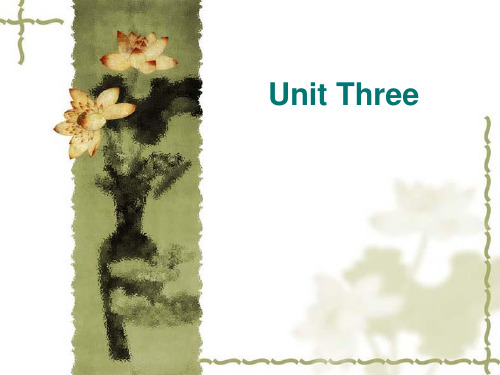
III Library work 1. The Leatherstocking Tales is a series of novels by American writer James Fenimore Cooper, each featuring the main hero Natty Bumppo, known by European settlers as "Leatherstocking," 'The Pathfinder", and "the trapper" and by the Native Americans as "Deerslayer," "La Longue Carabine" and "Hawkeye".
Through violence you may murder the liar, but you cannot murder the lie, nor establish the truth. Through violence you may murder the hater, but you do not murder hate, In fact violence merely increases hate. So it goes. Returning violence for violence multiplies violence, adding deeper darkness to a night already devoid of stars. Darkness cannot drive out darkness, only light can do that. Hate cannot drive out hate, only love can do that." -Martin Luther King, Jr
2020人教版PEP英语六年级上册课文Unit-Three
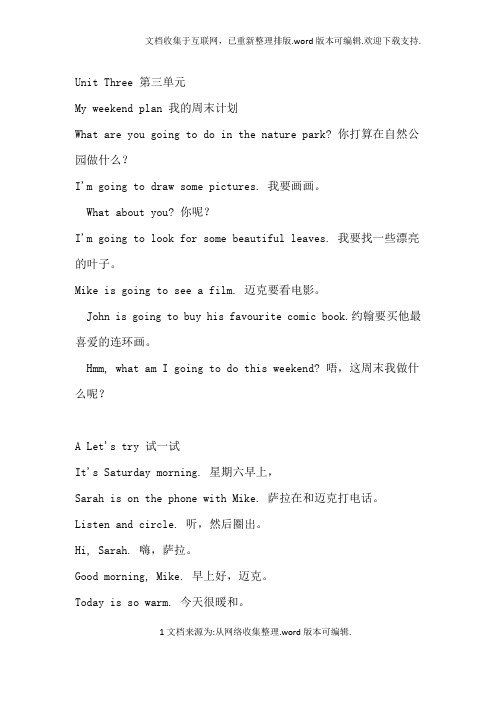
Unit Three 第三单元My weekend plan 我的周末计划What are you going to do in the nature park? 你打算在自然公园做什么?I'm going to draw some pictures. 我要画画。
What about you? 你呢?I'm going to look for some beautiful leaves. 我要找一些漂亮的叶子。
Mike is going to see a film. 迈克要看电影。
John is going to buy his favourite comic book.约翰要买他最喜爱的连环画。
Hmm, what am I going to do this weekend? 唔,这周末我做什么呢?A Let's try 试一试It's Saturday morning. 星期六早上,Sarah is on the phone with Mike. 萨拉在和迈克打电话。
Listen and circle. 听,然后圈出。
Hi, Sarah. 嗨,萨拉。
Good morning, Mike. 早上好,迈克。
Today is so warm. 今天很暖和。
1文档来源为:从网络收集整理.word版本可编辑.Let's go swimming. 我们去游泳吧。
Sorry, I can't. 对不起,我不能去。
I have to do my homework now. 我现在必须做作业。
B: OK. 好吧。
What about this afternoon? 那今天下午呢?No, I can't. 也不行。
I'm going fishing. 我要去钓鱼。
1. Can Mike go swimming today? 迈克今天能去游泳吗?2. Why or why not? 为什么?Let's talk 谈话Mike: What are you going to do tomorrow? 明天你打算做什么?Sarah: I'm going to have an art lesson. 我要上美术课。
Unit three
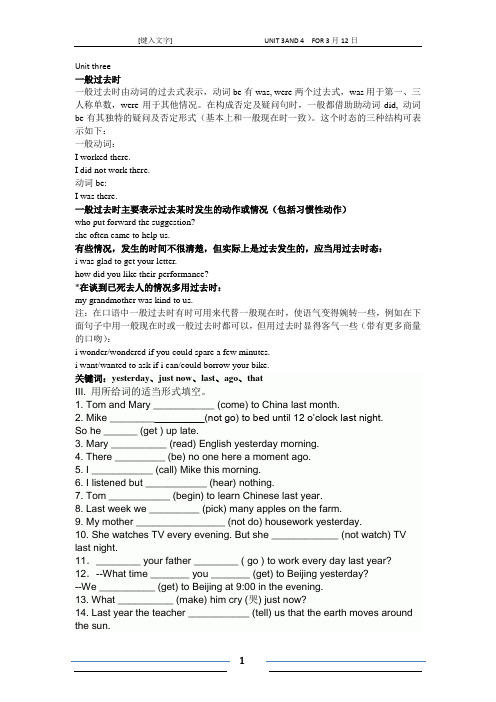
Unit three一般过去时一般过去时由动词的过去式表示,动词be有was, were两个过去式,was用于第一、三人称单数,were用于其他情况。
在构成否定及疑问句时,一般都借助助动词did, 动词be有其独特的疑问及否定形式(基本上和一般现在时一致)。
这个时态的三种结构可表示如下:一般动词:I worked there.I did not work there.动词be:I was there.一般过去时主要表示过去某时发生的动作或情况(包括习惯性动作)who put forward the suggestion?she often came to help us.有些情况,发生的时间不很清楚,但实际上是过去发生的,应当用过去时态:i was glad to get your letter.how did you like their performance?*在谈到已死去人的情况多用过去时:my grandmother was kind to us.注:在口语中一般过去时有时可用来代替一般现在时,使语气变得婉转一些,例如在下面句子中用一般现在时或一般过去时都可以,但用过去时显得客气一些(带有更多商量的口吻):i wonder/wondered if you could spare a few minutes.i want/wanted to ask if i can/could borrow your bike.关键词:yesterday、just now、last、ago、thatIII. 用所给词的适当形式填空。
1. Tom and Mary ___________ (come) to China last month.2. Mike _________________(not go) to bed until 12 o’clock last night.So he ______ (get ) up late.3. Mary __________ (read) English yesterday morning.4. There _________ (be) no one here a moment ago.5. I ___________ (call) Mike this morning.6. I listened but ___________ (hear) nothing.7. Tom ___________ (begin) to learn Chinese last year.8. Last week we _________ (pick) many apples on the farm.9. My mother ________________ (not do) housework yesterday.10. She watches TV every evening. But she ____________ (not watch) TV last night.11.________ your father ________ ( go ) to work every day last year? 12.--What time _______ you _______ (get) to Beijing yesterday?--We __________ (get) to Beijing at 9:00 in the evening.13. What __________ (make) him cry (哭) just now?14. Last year the teacher ___________ (tell) us that the earth moves around the sun.15. There ____________ a telephone call for you just now. (be)16. There __________ not enough people to pick apples that day. ( be)17. There _____________( be not) any hospitals in my hometown (家乡) in 1940.18. There ____________ enough milk at home last week, wasn’t there?19. Eli ____________ to Japan last week. ( move)20. –When _______ you _________ (come) to china? Last year.1. 分词作状语分词在句子中作状语,可以表示时间、条件、原因、结果(补充说明)、让步、伴随等。
九年级Unit3课文翻译
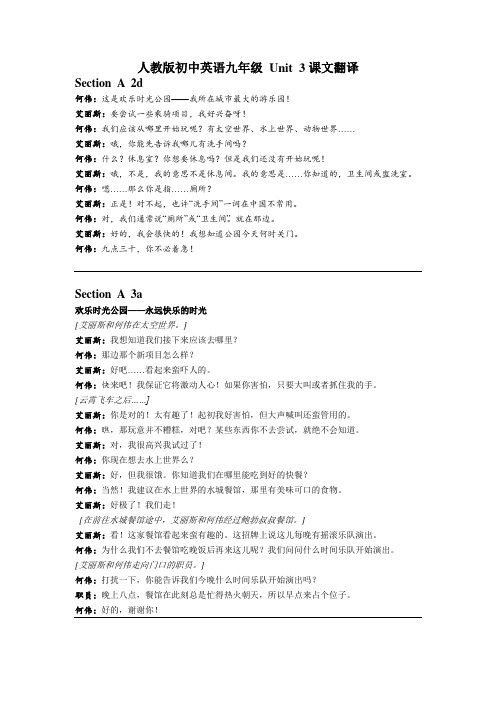
人教版初中英语九年级Unit 3课文翻译Section A 2d何伟:这是欢乐时光公园——我所在城市最大的游乐园!艾丽斯:要尝试一些乘骑项目,我好兴奋呀!何伟:我们应该从哪里开始玩呢?有太空世界、水上世界、动物世界……艾丽斯:哦,你能先告诉我哪儿有洗手间吗?何伟:什么?休息室?你想要休息吗?但是我们还没有开始玩呢!艾丽斯:哦,不是,我的意思不是休息间。
我的意思是……你知道的,卫生间或盥洗室。
何伟:嗯……那么你是指……厕所?艾丽斯:正是!对不起,也许“洗手间”一词在中国不常用。
何伟:对,我们通常说“厕所”或“卫生间”。
就在那边。
艾丽斯:好的,我会很快的!我想知道公园今天何时关门。
何伟:九点三十,你不必着急!Section A 3a欢乐时光公园——永远快乐的时光[艾丽斯和何伟在太空世界。
]艾丽斯:我想知道我们接下来应该去哪里?何伟:那边那个新项目怎么样?艾丽斯:好吧……看起来蛮吓人的。
何伟:快来吧!我保证它将激动人心!如果你害怕,只要大叫或者抓住我的手。
[云霄飞车之后……]艾丽斯:你是对的!太有趣了!起初我好害怕,但大声喊叫还蛮管用的。
何伟:瞧,那玩意并不糟糕,对吧?某些东西你不去尝试,就绝不会知道。
艾丽斯:对,我很高兴我试过了!何伟:你现在想去水上世界么?艾丽斯:好,但我很饿。
你知道我们在哪里能吃到好的快餐?何伟:当然!我建议在水上世界的水城餐馆,那里有美味可口的食物。
艾丽斯:好极了!我们走![在前往水城餐馆途中,艾丽斯和何伟经过鲍勃叔叔餐馆。
]艾丽斯:看!这家餐馆看起来蛮有趣的。
这招牌上说这儿每晚有摇滚乐队演出。
何伟:为什么我们不去餐馆吃晚饭后再来这儿呢?我们问问什么时间乐队开始演出。
[艾丽斯和何伟走向门口的职员。
]何伟:打扰一下,你能告诉我们今晚什么时间乐队开始演出吗?职员:晚上八点,餐馆在此刻总是忙得热火朝天,所以早点来占个位子。
何伟:好的,谢谢你!Section B 2b请问您能……?当你在外国旅游时,知道如何礼貌地寻求帮助很重要。
九年级英语第三单元知识点完整版
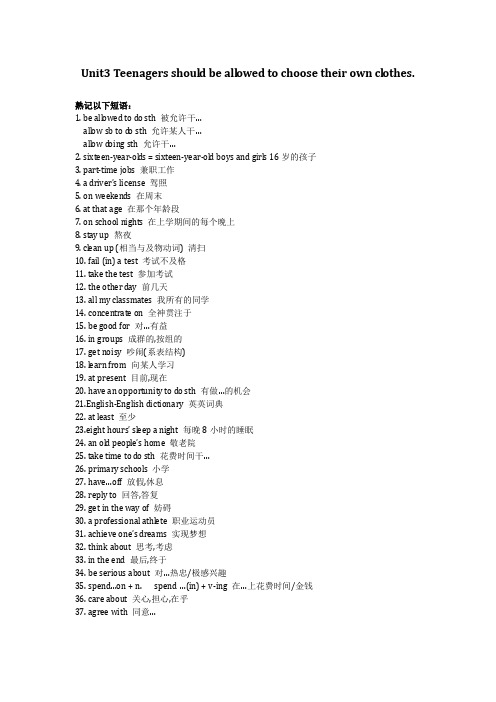
Unit3 Teenagers should be all owed to choose their own cl othes.熟记以下短语:1. be all owed to d o sth 被允许干…all ow sb to d o sth 允许某人干…allow d oing sth 允许干…2. sixteen-year-olds = sixteen-year-ol d boys and girls 16岁的孩子3. part-time jobs 兼职工作4. a driver’s license 驾照5. on weekends 在周末6. at that age 在那个年龄段7. on school nights 在上学期间的每个晚上8. stay up 熬夜9. cl ean up (相当与及物动词) 清扫10. fail (in) a test 考试不及格11. take the test 参加考试12. the other day 前几天13. all my classmates 我所有的同学14. concentrate on 全神贯注于15. be good for 对…有益16. in groups 成群的,按组的17. get noisy 吵闹(系表结构)18. l earn from 向某人学习19. at present 目前,现在20. have an opportunity to do sth 有做…的机会21.English-English dictionary 英英词典22. at l east 至少23.eight hours’ sleep a night 每晚8小时的睡眠24. an ol d peopl e’s home 敬老院25. take time to do sth 花费时间干…26. primary schools 小学27. have…off 放假,休息28. reply to 回答,答复29. get in the way of 妨碍30. a professional athlete 职业运动员31. achieve one’s dreams 实现梦想32. think about 思考,考虑33. in the end 最后,终于34. be serious about 对…热忠/极感兴趣35. spend…on + n. spend …(in) + v-ing 在…上花费时间/金钱36. care about 关心,担心,在乎37. agree with 同意…1.语态:①英语有两种语态:主动语态和补动语态 主动语态表示是动作的执行者被动语态表示主语是动作的承受者(主动语态)猫吃鱼。
九年级英语UnitThree

九年级英语Unit Three:There are lots of rules in our school. For example, we should wear school uniforms on weekdays. We are not allowed to grow our hair long or get ears pierced. We are not allowed to be late for school. If we have anything wrong, we should ask for a leave. We aren't allowed to cheat in our exams, either. Of course, we can't copy others' homework and we should finish doing our homework on time. On weekdays, we are not allowed to watch TV and we mustn't bring mobile phones into the school. But we are allowed to study with friends and do some volunteer work on weekends.I mostly agree to the school rules. But I think students should be allowed to bring mobile phones to school because if we have any problems, we can get in touch with our parents at once._____________________________________________________________________ _________________There are lots of rules for the students, and there are also some rules for us teachers in our school.Teachers are not allowed to get to work late. We are allowed to wear our own clothes. But we mustn't wear strange clothes. And on a special day, we have to wear school uniforms. We are allowed to get back home from work after 6:00 pm if we finish our work. But most of the time, we get off work after 8:00 or 10:00 in the evening.We are allowed to go out to relax once a week. We can sing songs in the KTV house and go shopping. We are allowed to have free meals at school every day. All the teachers appreciate the generosity from the school.。
研究生综合英语2(修订版)unitthree课文翻译
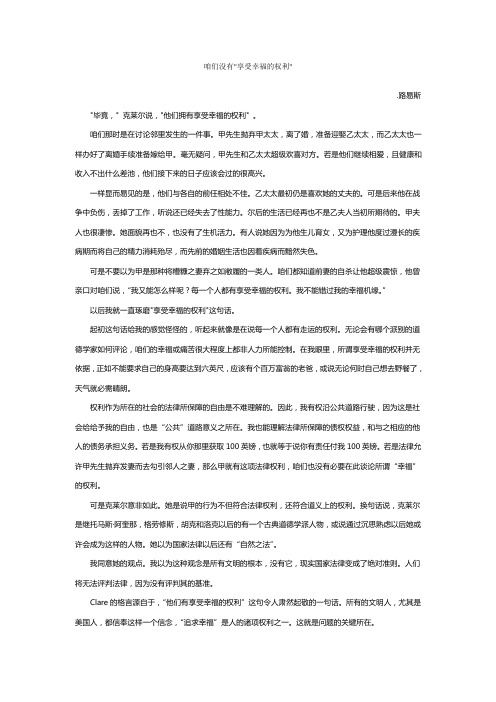
咱们没有"享受幸福的权利".路易斯"毕竟," 克莱尔说,"他们拥有享受幸福的权利" 。
咱们那时是在讨论邻里发生的一件事。
甲先生抛弃甲太太,离了婚,准备迎娶乙太太,而乙太太也一样办好了离婚手续准备嫁给甲。
毫无疑问,甲先生和乙太太超级欢喜对方。
若是他们继续相爱,且健康和收入不出什么差池,他们接下来的日子应该会过的很高兴。
一样显而易见的是,他们与各自的前任相处不佳。
乙太太最初仍是喜欢她的丈夫的。
可是后来他在战争中负伤,丢掉了工作,听说还已经失去了性能力。
尔后的生活已经再也不是乙夫人当初所期待的。
甲夫人也很凄惨。
她面貌再也不,也没有了生机活力。
有人说她因为为他生儿育女,又为护理他度过漫长的疾病期而将自己的精力消耗殆尽,而先前的婚姻生活也因着疾病而黯然失色。
可是不要以为甲是那种将糟糠之妻弃之如敝履的一类人。
咱们都知道前妻的自杀让他超级震惊,他曾亲口对咱们说,“我又能怎么样呢?每一个人都有享受幸福的权利。
我不能错过我的幸福机缘。
”以后我就一直琢磨"享受幸福的权利"这句话。
起初这句话给我的感觉怪怪的,听起来就像是在说每一个人都有走运的权利。
无论会有哪个派别的道德学家如何评论,咱们的幸福或痛苦很大程度上都非人力所能控制。
在我眼里,所谓享受幸福的权利并无依据,正如不能要求自己的身高要达到六英尺,应该有个百万富翁的老爸,或说无论何时自己想去野餐了,天气就必需晴朗。
权利作为所在的社会的法律所保障的自由是不难理解的。
因此,我有权沿公共道路行驶,因为这是社会给给予我的自由,也是“公共”道路意义之所在。
我也能理解法律所保障的债权权益,和与之相应的他人的债务承担义务。
若是我有权从你那里获取100英镑,也就等于说你有责任付我100英镑。
若是法律允许甲先生抛弃发妻而去勾引邻人之妻,那么甲就有这项法律权利,咱们也没有必要在此谈论所谓“幸福”的权利。
可是克莱尔意非如此。
九年级上册英语u三t三知识点
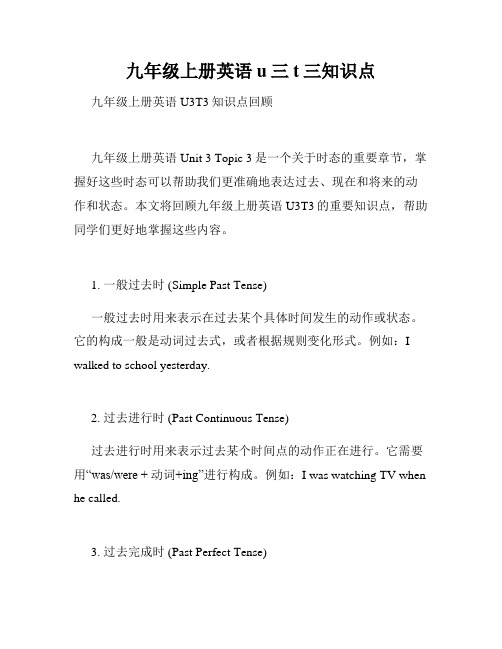
九年级上册英语u三t三知识点九年级上册英语U3T3知识点回顾九年级上册英语Unit 3 Topic 3是一个关于时态的重要章节,掌握好这些时态可以帮助我们更准确地表达过去、现在和将来的动作和状态。
本文将回顾九年级上册英语U3T3的重要知识点,帮助同学们更好地掌握这些内容。
1. 一般过去时 (Simple Past Tense)一般过去时用来表示在过去某个具体时间发生的动作或状态。
它的构成一般是动词过去式,或者根据规则变化形式。
例如:I walked to school yesterday.2. 过去进行时 (Past Continuous Tense)过去进行时用来表示过去某个时间点的动作正在进行。
它需要用“was/were + 动词+ing”进行构成。
例如:I was watching TV when he called.3. 过去完成时 (Past Perfect Tense)过去完成时用来表示在过去某个时间之前完成的动作。
它需要用“had + 过去分词”来构成。
例如:He had studied English before he moved to the UK.4. 现在完成时 (Present Perfect Tense)现在完成时用来表示从过去持续到现在的时间段内发生的动作或状态,或者与现在有关的过去动作。
它一般由“have/has + 过去分词”构成。
例如:I have lived here for 10 years.5. 将来完成时 (Future Perfect Tense)将来完成时用于表示将来某个时间之前就完成的动作。
它的构成形式是“will have + 过去分词”。
例如:By the time you arrive, Iwill have finished my homework.以上是九年级上册英语U3T3的重要知识点,通过对这些时态的掌握,我们可以更准确地表达过去、现在和将来的动作和状态。
UnitThreeMyfriendsALet'stalk(教案)人教PEP版英语四年级上册

第一课时课时内容A. Let’s talk;Let’s play课时分析在"Let's Talk"这个部分,故事发生在John放学回家的时候。
他兴奋地告诉妈妈说他交了一个新朋友。
妈妈好奇地问这个朋友是不是中国人。
John回答说是的,他还告诉妈妈这位新朋友非常友好,而且个子又高又壮。
他的名字叫张鹏。
这个过程中,展示了句子:"What’s his name? His name is Zhang Peng. He is tall and strong." 这个环节旨在让学生学会用"What’s his name"来询问男性的名字,以及使用"His name is..."来回答。
在"Let's Play"这个活动中,以Sarah和Chen Jie两个人的猜朋友游戏为例,来练习如何询问女性的姓名以及如何回答。
在这个活动里,Sarah首先使用句子"She’s tall and thin"来描述她的朋友的外貌特征,然后Chen Jie使用句子"What’s her name?"来询问这位朋友的名字,最后Sarah用"Her name is..."来回答。
在这节课中,学生会学到如何正确地询问别人的姓名,需要根据性别来选择使用"his"、"her"、"he"或"she"。
同时,为了准确地描述朋友的外貌特征,学生需要掌握一些用于形容人外貌的形容词。
在本课时中,重点是确保学生理解并能正确使用这些重要的句式。
至于描述人外貌特征的部分,可以先让学生理解概念,不必要求完全掌握。
课时目标1. 能够听懂、会说句型:What’s his/ her name? His/ Her name is ...2. 能够听懂、会说以下词汇:friendly, tall, strong, thin3. 能够听懂、会读对话,并能分角色表演。
Unit three 完整答案- 新目标大学英语《综合教程》 第一册
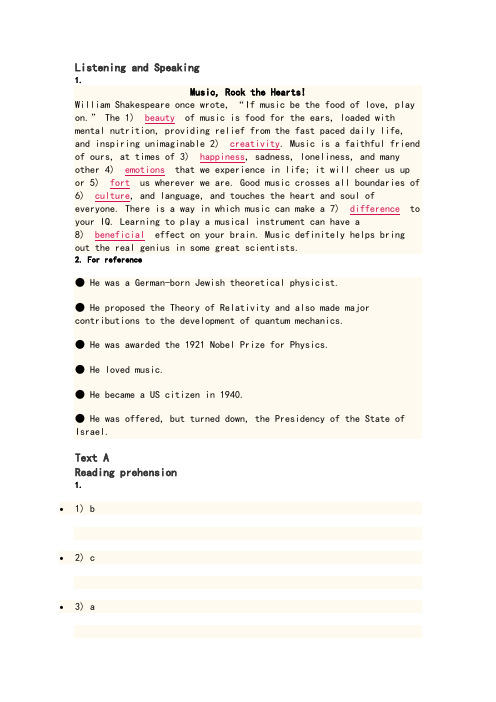
Listening and Speaking● He was a German-born Jewish theoretical physicist.● He proposed the Theory of Relativity and also made majorcontributions to the development of quantum mechanics.● He was awarded the 1921 Nobel Prize for Physics.● He loved music.● He became a US citizen in 1940.● He was offered, but turned down, the Presidency of the State ofIsrael.Text AReading prehension1.•1) b•2) c•3) a•4) e•5) f•6) d•7) j•8) g•9) h•10) i2.A. Einstein’s academic popularity:1) There is no other personality in the academic world that has evenhalf Einstein’s popularity.2) There is no genius in the world as respected and as loved asAlbert Einstein.3) Nowhere in the world could we find another academic that rivalsthe popularity of rock superstars.4) His opus “E=mc2” would rival any Beatles’ platinum record.5) His “Theory of Relativity” even shook Newton’s gravitationaltheory off the charts.B. Einstein’s love of and gift for music:1) Had he lived later, he could easily pass as the only male memberof the Bond electric Quartet.2) Had he not been a scientist, he would have been a musician.3) Einstein, with unclipped moustache and unkempt hair, didactually perform in solo concerts!4) Einstein shone in a deeply felt performance of an adagio from oneof the Beethoven sonatas before his 17th birthday.5) In addition to his prowess on the violin, he also played the pianoand, in particular, loved to improvise.C. Einstein’s gift brought out by music:1) Albert Einstein believed that he got most joy in life out ofmusic.2) Albert Einstein himself admitted that the reason he was so smartwas because he played the violin.3) One friend, G. J. Withrow, confided that the way Einstein dealtwith problems and equations was by improvising on the violin.4) Einstein’s second wife, Elsa said that music helped him when hewas thinking about his theories.5) His son Hans said that Albert Einstein took refuge in music,which would usually resolve all his difficulties.Reading and Discussing3.For reference1) Albert Einstein himself admitted that the reason he was so smartwas because he played the violin. One friend, G. J. Withrow, confided that the way Einstein dealt with problems and equations was byimprovising on the violin. His second wife, Elsa, said music helped him when he was thinking about his theories. His son Hans AlbertEinstein too recalled his father using music as a tool to help his work.2) Music is important to most people, including me. Music can help meconcentrate on my homework. Music is a way of life. It can beinterpreted in many ways and life without it would be like lifewithout color. It gives me a chance to express myself in ways that nothing else can.Language in Use4.•1) popularity•2) gorgeous•3) distinctive•4) rival•5) is/was revealed•6) professionals•7) was resolved•8) genius•9) icon•10) was adored5.•1) gives a glimpse of •2) based on•3) deal with•4) pass as/for•5) had jotted down•6) take refuge•7) came to mind•8) fall in love•e) bring forward•f) bring back•g) bring up•h) bring in•1) bring about•2) brought back/brings back•3) bring up•4) bring forth•5) bring out•6) bring … down•7) bring in•8) bring forward7.•1) hardship•2) popularized•3) Creative•4) consumption•5) significant•6) admirable•7) simplify•8) musical•9) performance•10) professional8.Reference translation1) 描述天才时,爱因斯坦是你能找到的最合适的例子,就连小孩都熟悉他。
五年级下册一对一Unit Three单元知识整理
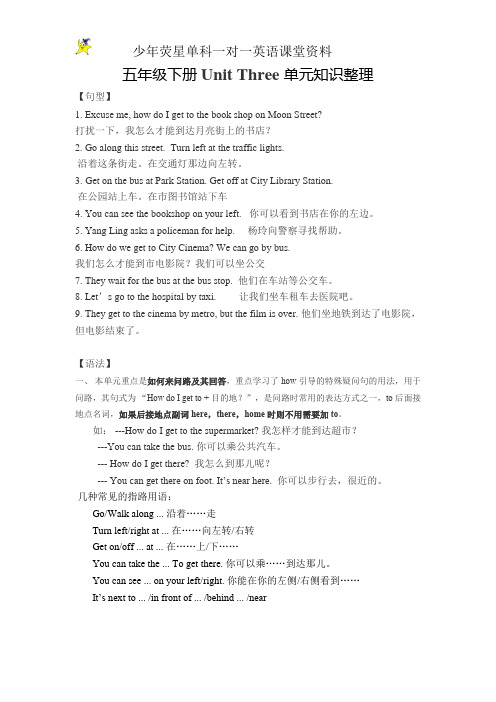
五年级下册Unit Three单元知识整理【句型】1. Excuse me, how do I get to the book shop on Moon Street?打扰一下,我怎么才能到达月亮街上的书店?2. Go along this street. Turn left at the traffic lights.沿着这条街走。
在交通灯那边向左转。
3.Get on the bus at Park Station. Get off at City Library Station.在公园站上车。
在市图书馆站下车4. You can see the bookshop on your left. 你可以看到书店在你的左边。
5. Yang Ling asks a policeman for help. 杨玲向警察寻找帮助。
6. How do we get to City Cinema? We can go by bus.我们怎么才能到市电影院?我们可以坐公交7. They wait for the bus at the bus stop. 他们在车站等公交车。
8. Let’s go to the hospital by taxi. 让我们坐车租车去医院吧。
9. They get to the cinema by metro, but the film is over. 他们坐地铁到达了电影院,但电影结束了。
【语法】一、本单元重点是如何来问路及其回答,重点学习了how引导的特殊疑问句的用法,用于问路,其句式为“How do I get to + 目的地?”,是问路时常用的表达方式之一,to后面接地点名词,如果后接地点副词here,there,home时则不用需要加to。
如: ---How do I get to the supermarket? 我怎样才能到达超市?---You can take the bus. 你可以乘公共汽车。
新译林版英语七年级上册UnitThree单词短语句子及知识点

初一英语unit3 一、单词1、哪一个2、最好的3、因此、所以4、生物5、地理6、历史7、日期8、会议、集会9、…点钟10、好,不错11、大门12、如此,非常13、带,领14、到处15、领某人参观16、前面17、在。
前面18、建筑物19、地面20、一楼21、明亮的22、现代的,新式的23、礼堂24、日记25、看一看26、墙27、让我想想28、下课后29、什么,再说一遍30、电话31、通电话32、从。
到。
33、需要。
时间34、起床35、去上学36、上午、下午37、阅览室38、只有39、当然40、种类41、各种各样的42、借,借用43、向。
借44、信45、少数的46、一些47、离开48、远离49、步行50、一切顺利,万事如意二、短语1、欢迎来到我们的学校2、擅长于3、有两块蛋糕4、可以吃三个5、告诉某人关于6、了解7、10月9日8、开放日9、家长会10、下午两点11、让我们见面12、之后13、观摩两节我们的课14、在学校门口15、看起来漂亮16、那么大17、带你逛一逛18、在教学楼的前面19、在大楼的底层20、干净而又明亮21、这边22、有一间美术教室、一间音乐教室和两间电脑室23、有个图书馆24、看起来很现代25、那儿26、有一个学校会堂27、开会28、穿白衬衫的男人29、看起来年轻30、去会堂31、在教学楼的后面32、在图书馆33.在这天参观我们的学校34. 去那儿35.都喜欢它36. 住在北京37. 在7年级1班38、在足球队里39、喜爱跳舞40、都很好41、看42、墙上我朋友的图片43、让我看看44、非常喜爱他们45、在新学校46、和他们玩47、都喜欢他48、在家49、想要向他问好50、电话里听得清楚51、乘公共汽车去学校52、骑车去学校53、走着去上学54、从我家到学校55、半个小时56、5点起床57、到学校58、开着59、从上午8点到下午5点半60、阅览室61、各种各样的书62、向。
借63、过马路64、带给我一个生日蛋糕65、在回家的路上66、把…放在书上67、感谢做某事68、看书69、下课70、远离71、向左看|向右看72、和…好朋友73、离…很远74、一些75、一些信息关于…76、虽然…但是…三、句式1、今天的日期是多少?是…2、让我们1:30在学校门口见面3、我在第一中学学习4、我们学校有18间教室5、我们学校没有操场/图书馆/礼堂6、它虽然不大,但是很漂亮7、我家离学校远/我住在学校附近8、你每天怎么去上学。
- 1、下载文档前请自行甄别文档内容的完整性,平台不提供额外的编辑、内容补充、找答案等附加服务。
- 2、"仅部分预览"的文档,不可在线预览部分如存在完整性等问题,可反馈申请退款(可完整预览的文档不适用该条件!)。
- 3、如文档侵犯您的权益,请联系客服反馈,我们会尽快为您处理(人工客服工作时间:9:00-18:30)。
Unit ThreeIntroducing and Describing People教学目标:通过本单元的学习,使学生掌握如何自我介绍及描述相关的人和物,能熟练地与他人进行初次见面的对话。
训练学生英汉互译包含重点词语或结构的句子,培养学生的英语表达能力。
教学重点:掌握单词:health valuable earn overweight curlyhobby application obtain particular personalprovide special abroad bear掌握词组:make self-introduction be skilled in a little bitbegin with in / after class so (much) thatnot only….but also share….with in painin good health have….as掌握句型和习惯表达法:1. May I introduce myself?2. Glad to know you.3. I’m lucky to have you as my classmate.4. I’ll come to meet you in the classroom.5. I want to become a member of the club.6. I’m in very good health , and I can run very fast.7. I would like to be your friend not only in class, but also after class.8. I like Chinese culture so much that my hobby is Chinese painting.教学难点: 1. how to introduce and describe people;2.how to understand similar information, such as name,age, sex, nationality, origin, job, family, characterand physical appearance from others;3.how to exchange information and views on thesematters with others;4.how to engage in discussion and account for your views.课时分配: 1. Listen and Talk 2学时2. Read and Explore Passage A 2 学时; Passage B 2学时3.Grammar and Exercises 2 学时课外练习: 1.Vobulary 2. Write and Produce推荐读物:《新编大学英语》第一册第一课Growing up教学过程:Culture Notes:1. Mr, Mrs,Miss, Ms Mr is the title placed before a man‟s lastname, e.g. Mr Smith. Mrs and Miss are also titles. Mrs is placed before a married Woman‟s last name and Miss before the last name of an unmarried woman or a girl. Nowadays, the titleMs/miz/ is also used to address both married women and single women. Notice these titles are used only before last names. They are not used with first names only, e.g. you can say: Mr Smith, or Mr Henry Smith, but you can‟t say Mr Henry.2.Visa and Passport passport is the government document to becarried by a traveler abroad, giving personal particulars, such as name, age, sex, nationality and so on. Visa is the stamp or signature put on a passport to show that it has been examined and approved by the officials of a foreign country which the owner intends to visit ( …entrance or …entry visa ) or leave ( … exit visa ).3.How to Make Introduction A great difference betweenAmerican social customs and those of other countries lies in how names are used. Most Americans don‟t like using Mr, Mrs, or Miss.They find these terms too formal. People of all ages prefer to use first names instead of titles and last names. For example, one may say, “How do you do? My name is Wilson-----James Wilson. Call me James.”“Glad to meet you . I‟m Miller. But call me Paul.”Sometimes the ladies you first meet may say, “Don‟t call me Mrs Smith, just call me Sally.” So when your American fiends do not use your last name or titles, that doesn‟t mean any lack of respect .Using first names usually shows friendliness.Language Points:Professer Water Introduces Herself1. Professer Water wants to teach her students how to makeself-introduction and describe themselves. She is going to begin…..describe : say what is like; give a picture of in wordse.g. Words cannot~ the beauty of the scene.description: n. picture in wordsdescriptive: adj. serving to describingdescribe themselves: say something about themselves such as name, nationality, hobby and so on.begin with: start withe.g. They begin their journey with a walk2. This is my first class and I’d like to introduce myself to you.introcedu:(1) make (persons) known by name (to one another)~ sb (to sb) e.g. The chairman ~d the lecturer to the audience.(2) bring in; bring forward: ~ a Bill before Parliament.(3) bring sth into use or into operation for the first time;cause sb to be acquainted with sthe.g. The teacher ~d his young pupils to theintricacies of geometryTobacco was ~d into Europe from America 3. I’m 1.70 meters tall and perhaps a little bit overweight.overweight: exceeding the weight allowed or normale.g. If your luggage is ~ you will have to pay extra4. I like Chinese culture so much that my hobbies are ….hobby: occupation, not one‟s regular business, for one‟s leisure timee.g. He likes stamp, and his hobby is stamp-collecting5. I enjoy Chinese food and I’m also quite skilled in using….be skilled in : be good atbe skilled in doing sthe.g. Mama is skilled in making cake6.I like sports and I’m in very good health.health: n. the state of being well in the body and minde.g. Health is more important than moneyWe drink to his parents‟ healthhealthy: a. physically strong and not often ille.g. Although she is 80 years old, she is still ~ in her mind----Ant. Unhealthy: a. not usually in good healthe.g. The ~ children couldn‟t get food and fresh airA passport7. A citizen of a country can obtain a special government agency.obtain: get; secure for oneself; buy; have lent or granted to oneselfe.g. where can I ~ the bookobtainable: that can be obtainedspecial: not common , usual or generale.g. I have sth ~ to discuss with you8.abroad: adv. In or to a foreign country or countries; away fromone‟s own countrye.g. Do you like being ~?9. A passport bears the holder’s photo and official seal.. bear:v. (1) have; showa document that ~s your signature(2) endure; tolerate; put up with . (usu with can/could,and esp in neg andinter) e.g. The pain was almost more than he could ~.(3) carry ~ a heavy load.10. It .provides the personal particulars about…provide: give, supplye.g. The school ~d the child with food and clothes.personal a. (1)private; individual; of a particular persone.g. I have sth ~to discuss with you.(2) done or made by a person himself e.g. The Prime Ministermade a ~ appearance at the meeting(3) of the body e.g. Personal cleanliness is important to health as well as to appearance.~ly: adv. In one‟s own person, not through an agent e.g. He conducted me ~ly through the mansion. particular(1) n. detail (2) a. relating to one as distinct from others; special; outstanding. in ~ e.g. I remember one if them in ~.11.To apply for a visa to go abroad, you must submit yourpassport together with. …apply v. to request sth officially e.g. We‟ve applied to the council for special funds.Application n. an official request e.g. Have you filled in the application form for a new passport.submit (1) turn over to the higher authorities; hand in; presente. g. The President of the university ~ed a report to theDepartment of Education.(2) ~ oneself to sb/sth put oneself under the control of anothere.g. Should a wife ~ herself to her husband?(3) ~ to sb/sth surrender; give in; abstain from resistance e.g.The poor child ~ed to separation from his family..。
